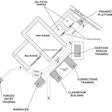The mid-term elections earlier this month reflected the continuing discontent of many voters in today's lingering bad economy. Across the nation, many incumbents and party favorites lost their seats in stunning upsets. Predictably, many tax measures also went down in defeat. The message voters sent resounded loud and clear.
Voter discontent reflects a growing resentment across America against what are perceived as public sector abuses. Headlines today are filled with stories such as the exorbitant public officials' salaries and pensions in Bell, Calif. In late September, Los Angeles County Sheriffs' deputies arrested eight Bell officials including the mayor and ex-city manager. Also, California's attorney general sued the Bell officials, accusing them of defrauding taxpayers.
Weekly public-pension news stories abound across much of America, along with growing demands for public pension reforms. Meanwhile, with their tax bases shrinking dramatically, a growing number of states, counties and cities are being forced to reduce their workforces, along with services they provide to the public.
Take the examples of two California cities — Oakland and Antioch. Both cities pushed hard for tax measures to bring in much-needed tax revenues to help prevent the layoffs of officers and reduction of police services in both Bay Area cities. Despite the critical need for both the Oakland PD and Antioch PD, the voters defeated both cities' tax measures.
Now, Oakland and Antioch police are facing even more severe cuts in both personnel and police services.
The Oakland PD is already woefully understaffed, recently reaching 1960s levels, and still reeling from the layoff of 80 officers in July. Now, the department faces the distinct possibility of being forced to lay off an additional 122 officers.
For a city of more than 400,000 residents with one of the highest crime rates in the nation, the loss of 122 more officers would shrink the department to less than 600 sworn officers. This scenario would be dire for the citizens of Oakland who continue to reel from high crime, three violent protests/riots since January 2009, and the murder of four officers in March 2009.
The situation for Antioch PD is equally dire. Reduced taxes have already forced cutbacks in services, along with the layoffs of more than 20 school resource officers. APD is down 50 officers from authorized strength — the lowest level in 20 years. Meanwhile, both population and crime in Antioch have spiked during the same time period.
APD is doing all it can to avoid police layoffs, including using attrition - not replacing officers who leave APD. With the defeat of the Nov. 4 tax measure, the Antioch PD may be forced to lay off as many as 20 officers. Their loss would reduce APD to the unprecedented low level of 80-90 officers for a city of 100,000 residents with a matching crime rate.
What does this have to do with SWAT? Everything.
With so many LE agencies facing cutbacks in personnel and services, how many chiefs or sheriffs will be able (or willing) to retain their tactical teams? Even pro-SWAT chiefs and sheriffs will be hard-pressed to justify retaining their tactical teams at present staffing levels.
Full-time SWAT teams are already feeling the recession's pinch, downsizing through attrition, while the volume of their assignments increases. All to "justify" their continued existence.
Meanwhile, LE agencies with lesser-used teams are facing increasing pressure to "justify" having a SWAT team. A nationwide trend today is more and more tactical teams merging into multi-regional teams that share personnel, resources and assignments.
Very clearly, the winds of economic change are affecting many tactical teams across America.
What can the SWAT community do about all this? First, and foremost, continue to do what tactical teams do best, as the highly trained and skilled professionals you are. Continue to do our job of saving innocent lives, as well as handling high-risk situations and incidents beyond the capabilities of other LEOs. Strive for the respect of the citizens and LE agency your team serves.
What can you do to preserve and maintain your own tactical team? Be proactive. Be your agency's "tactical advisor." Foresee, anticipate, plan, and prepare for what's coming your way. Prepare for the "ultimate call out."
Be innovative, creative, adaptable, flexible, and realistic about "improvising, adapting and overcoming" the challenges of today's economic reality. And, above all, fight as a team for your team's continued service to your agency and citizens.




















